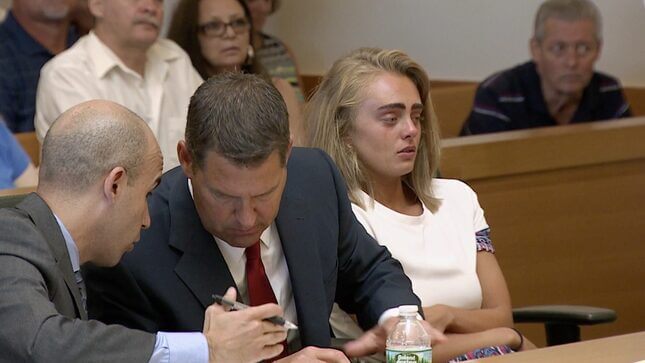
Screenshot: HBO
The central question at the heart of the Commonwealth v. Michelle Carter case is essentially: Can a text message kill someone? But Erin Lee Carr’s HBO documentary on the case, delivered in a two-part series, is a knotty tangle of questions that go far beyond that. Was the distinctly modern, textual intimacy between these two teenagers misread by adults in this case? Was Carter “involuntarily intoxicated” by the psychiatric drugs she was on and thus incapable of being responsible for her actions the day her boyfriend Conrad Roy III died by suicide? Was Carter’s bizarre obsession with the actress Lea Michele and young adult pop culture narratives about death somehow part of this tragedy?
These are all interesting threads to pull on when diving into this case, which found Michelle Carter guilty of involuntarily manslaughter after text messages revealed she’d been speaking with Roy as he died by suicide in 2014. Her guilt, according to the prosecution, hinged on a text message Carter had sent to a friend of hers following his death, in which she said Roy had gotten out of the car and she had told him to “get back in.” But the problem with I Love You, Now Die: Commonwealth v. Michelle Carter is that while it pulls on these threads in order to make sense of Carter’s involvement in Roy’s death, it doesn’t really do much with them. The documentary simultaneously casts a wide net when it comes to the larger cultural contexts that shaped this case, but the series itself is surprisingly limiting in its material.
Watching Commonwealth v. Michelle Carter feels kind of like watching Court TV, as the filmed proceedings of the case make up a bulk of the documentary. That footage is also the only time viewers get to hear from friends of Roy and Carter. The documentary features almost no interviews with classmates, teachers, or a few members of each of their respective communities to paint a picture of these two teenagers that isn’t defined by their lawyers or social media posts. Carter and her family declined every interview for the series, and what’s left is a film that despite providing ample evidence that Carter’s conviction wasn’t just, privileges the voices of Roy’s family. Pivotal insights in the documentary are also delivered via writers, including journalist Jesse Barron, who reported on the case for Esquire. He appears so often to explain the case and Carter’s mindset at length that it can feel like what you’re watching is less a documentary and more like sitting for a story-time.
Being cut off from Carter’s family is a huge blow to this documentary, but it’s not the only hole. The series continually attempts to connect Carter’s case to some larger, contextual narrative, such as the myth that teen girls are coercive witches, or the misleading closeness that comes with communication dominated by text messages alone, but these tidbits of commentary and analysis don’t go very deep. When one of the defense witnesses at Carter’s trial, Dr. Peter Breggin, introduces the idea that Carter was involuntarily intoxicated and “out of her mind,” the film very briefly offers a rebuttal in another psychiatrist who says that such a defense is almost never used and might not even be real. That’s an explosive response to a key part of Carter’s defense, but the documentary moves right along without stopping to dig in deeper.
The irony here is that for a case that may have overly relied on text messages to reach its verdict—text messages that do not necessarily convey the truth of Roy’s suicide—the documentary overly relies on them as well. To witness them is necessary to understanding the case, but in the absence of other voices to build a more well-rounded understanding of Carter, they simply aren’t enough. At one point in the documentary, the camera turns to random people in the town for man-on-the-street-style interviews to get their sense of the case; almost all of them believe Carter is guilty of murder. It’s a jarring, unnecessary scene, given the media attention this case has received, but is just another reminder that most people, including those watching this documentary, will only ever know Michelle Carter through the judgements of other people.